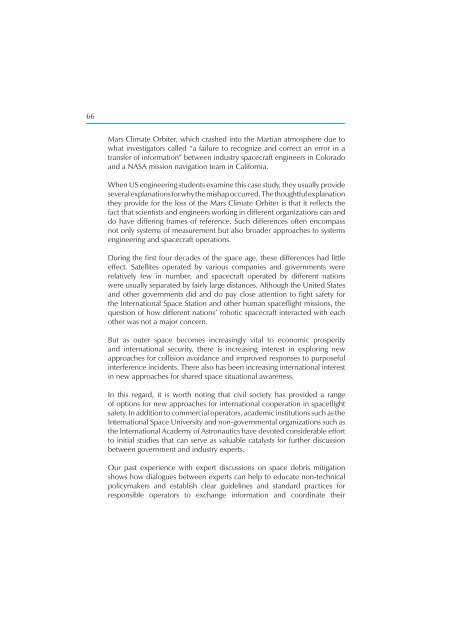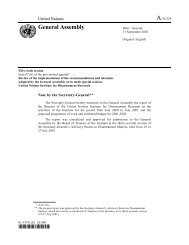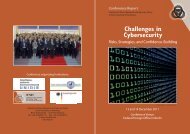Security in Space The Next Generation - UNIDIR
Security in Space The Next Generation - UNIDIR
Security in Space The Next Generation - UNIDIR
You also want an ePaper? Increase the reach of your titles
YUMPU automatically turns print PDFs into web optimized ePapers that Google loves.
66<br />
Mars Climate Orbiter, which crashed <strong>in</strong>to the Martian atmosphere due to<br />
what <strong>in</strong>vestigators called “a failure to recognize and correct an error <strong>in</strong> a<br />
transfer of <strong>in</strong>formation” between <strong>in</strong>dustry spacecraft eng<strong>in</strong>eers <strong>in</strong> Colorado<br />
and a NASA mission navigation team <strong>in</strong> California.<br />
When US eng<strong>in</strong>eer<strong>in</strong>g students exam<strong>in</strong>e this case study, they usually provide<br />
several explanations for why the mishap occurred. <strong>The</strong> thoughtful explanation<br />
they provide for the loss of the Mars Climate Orbiter is that it refl ects the<br />
fact that scientists and eng<strong>in</strong>eers work<strong>in</strong>g <strong>in</strong> different organizations can and<br />
do have differ<strong>in</strong>g frames of reference. Such differences often encompass<br />
not only systems of measurement but also broader approaches to systems<br />
eng<strong>in</strong>eer<strong>in</strong>g and spacecraft operations.<br />
Dur<strong>in</strong>g the fi rst four decades of the space age, these differences had little<br />
effect. Satellites operated by various companies and governments were<br />
relatively few <strong>in</strong> number, and spacecraft operated by different nations<br />
were usually separated by fairly large distances. Although the United States<br />
and other governments did and do pay close attention to fi ght safety for<br />
the International <strong>Space</strong> Station and other human spacefl ight missions, the<br />
question of how different nations’ robotic spacecraft <strong>in</strong>teracted with each<br />
other was not a major concern.<br />
But as outer space becomes <strong>in</strong>creas<strong>in</strong>gly vital to economic prosperity<br />
and <strong>in</strong>ternational security, there is <strong>in</strong>creas<strong>in</strong>g <strong>in</strong>terest <strong>in</strong> explor<strong>in</strong>g new<br />
approaches for collision avoidance and improved responses to purposeful<br />
<strong>in</strong>terference <strong>in</strong>cidents. <strong>The</strong>re also has been <strong>in</strong>creas<strong>in</strong>g <strong>in</strong>ternational <strong>in</strong>terest<br />
<strong>in</strong> new approaches for shared space situational awareness.<br />
In this regard, it is worth not<strong>in</strong>g that civil society has provided a range<br />
of options for new approaches for <strong>in</strong>ternational cooperation <strong>in</strong> spacefl ight<br />
safety. In addition to commercial operators, academic <strong>in</strong>stitutions such as the<br />
International <strong>Space</strong> University and non-governmental organizations such as<br />
the International Academy of Astronautics have devoted considerable effort<br />
to <strong>in</strong>itial studies that can serve as valuable catalysts for further discussion<br />
between government and <strong>in</strong>dustry experts.<br />
Our past experience with expert discussions on space debris mitigation<br />
shows how dialogues between experts can help to educate non-technical<br />
policymakers and establish clear guidel<strong>in</strong>es and standard practices for<br />
responsible operators to exchange <strong>in</strong>formation and coord<strong>in</strong>ate their








